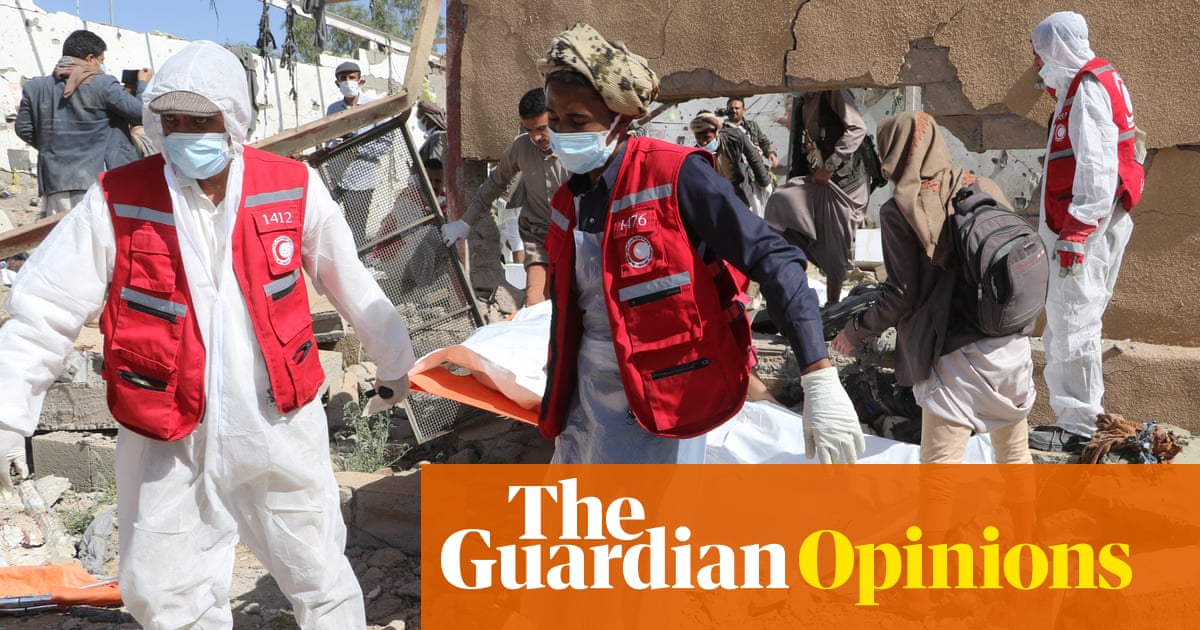This week’sRAF attack on Houthi rebelsin Yemen was the first to be approved by the Labour government. It joined a major US military operation thatstarted in Marchand has involved 45 days of airstrikes.Operation Rough Rideris a demonstration by the Trump administration that it will prosecute a vigorous war that is more intense than under Joe Biden, and has, according to the US,already seenmore than 1,000 targets hit.
The RAF operation reportedly targeted a plant manufacturing armed drones used in Houthi attacks on shipping transiting the Red Sea, and demonstrated thatKeir Starmerhas decided to be Donald Trump’s closest military ally.
Since shortly after the start of the current war in Gaza, the Houthis have been attacking commercial shipping linked in some way to Israel, with the stated motive of supporting the Palestinians. Traffic through the Suez canal almost halved between 2023 and 2024,according to one analysis. The main US response has been airstrikes, starting under Biden in January 2024, and included five series of airstrikes by the RAF early that year, all approved by Rishi Sunak’s Conservative government.
What is happening now is at a higher tempo, but has attracted little media attention. That may now change, an immediate concern being reports ofhigh civilian casualties.
These include a US attack earlier this week, whennearly 70 African migrantswere killed when a detention centre was bombed, according to the Houthis.
Since this war with the Houthis started, there have been thousands of targets hit, the great majority by US air force and navy units. But the UK’s involvement has been much more than merely symbolic. Six weeks ago, for example, a UK tanker aircraft operating out of RAF Akrotiri in Cyprus supported USAF aircraft during airstrikes thatkilled 53 people, including women and children.
The Akrotiri base may be specifically linked to the US war against theHouthis, but its significance in the wider Gaza war goes well beyond that – serving as a hub for the US and UK militaries as they support Israel in diverse ways.
RAF surveillance aircraft, for example, haveconducted more than 500 flightsover Gaza since the war started. While they are officially concerned with searching for hostages, they tend to be particularly intense when the Israel Defense Forces (IDF) are engaged in major offensives, and on one occasion a RAF spy plane even likely landed at a base in Israel itself.
Separately, US military aircraft have used Akrotiri for multiple functions, with the UK authorities deeply reluctant to provide information, even to members of parliament. Unofficial indications suggest that the potentialmovement of US special forcesinto Israel, as well as military transports taking in armaments, both go via Akrotiri.
The RAF and IDF have along and close relationship, with frequent visits of senior personnel each way. In addition, during the current Gaza war, there have been Israeli military transport aircraftlanding at the RAF’s main operating baseat Brize Norton in Oxfordshire.
Looking at these and other examples of the close connections between the UK and Israeli militaries, there are significant political consequences. The first concerns the evolution of the war itself, whereIsraelhas come under much greater criticism for the violence of its conduct, the longer the war has lasted.
Despite this, it is aided by Trump’s persistent support, which allows Benjamin Netanyahu’s government to act with impunity. Its conduct has already attracted the unwelcome attention of the international court of justice and the international criminal court. Israel has also reduced itself to being a pariah across much of the world, including states where there waspreviously much support.
SinceIsrael broke the recent ceasefire, its imposition of a blockade of food, medical supplies, fuel and water into the territory has added even more to the bitter criticisms. Moreover, even in the very unlikely event of an early end to the war, the damage will persist for many years, if not decades.
This is where the second political element comes in, especially in Britain with the Starmer government. Among a substantial proportion of the public, especially on the broad political left, support for the Palestinians has become deeply embedded in the political discourse.
It is reflected in the numerous demonstrations and meetings in towns and cities, many of them weekly yet scarcely reported in the mainstream media. Added to this are the instances ofdirect action against UK-based companiesproviding Israel with military equipment.
Labour’s rapid decline in the polls in recent months is down to many factors, but the Starmer government’s continuing support for Israel, despite its conduct in Gaza, is directly affecting committed long-term supporters on whom it depends. Many of the members who have left the party since last July’s general election did so with Gaza being the last straw.
This week’s RAF raid inYemencomes as part of Trump’s enlarged regional war and just as the Netanyahu government, with US support, uses increasingly brutal methods to bring Gaza under control. Just now, Starmer’s government could be using its limited influence to try to rein in Netanyahu. Instead, it is increasing its military support for Trump and getting even more embroiled in a deeply controversial conflict.
Paul Rogers is emeritus professor of peace studies at Bradford University
